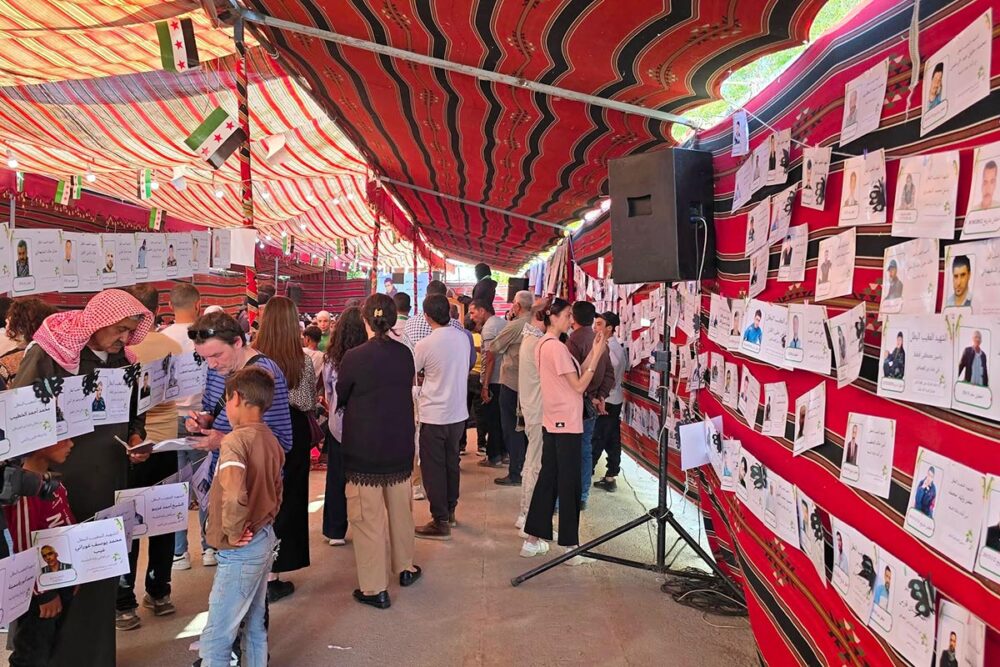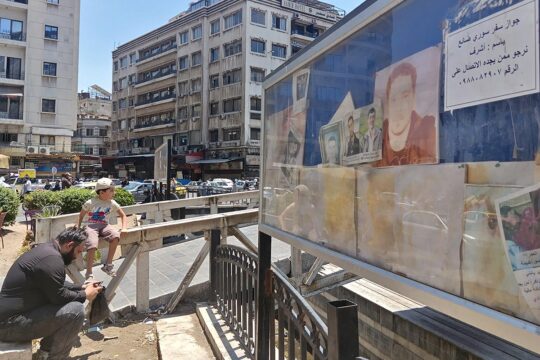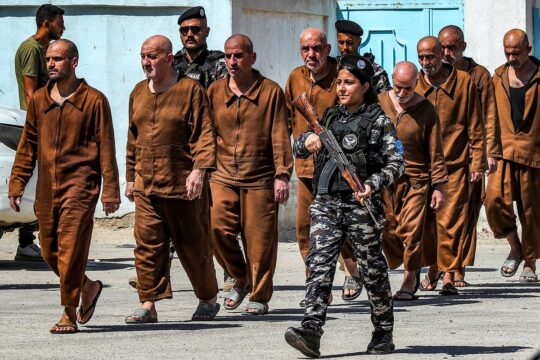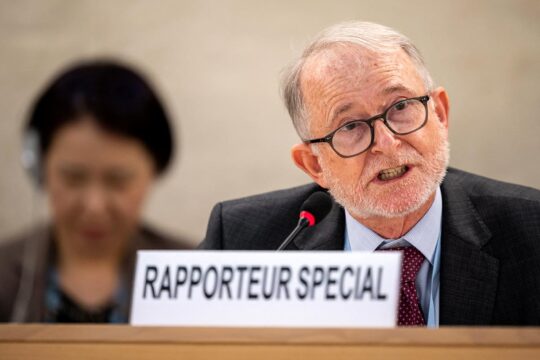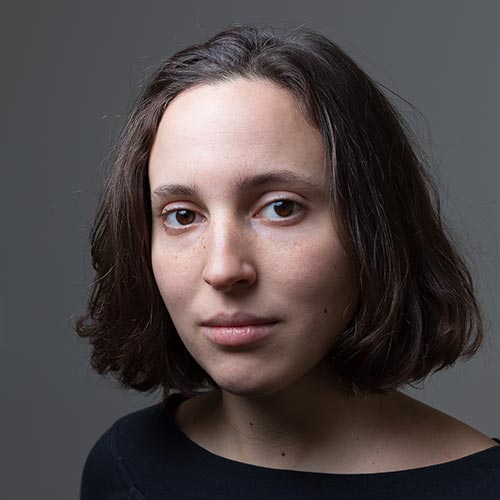JUSTICE INFO: You are one of the initiators of the so-called “truth tents”, where the families of the disappeared come together on a regular basis in different parts of Syria. What exactly happens there?
JAD AL-HAMADA: The members are mostly mothers. All tents start with them or other family members talking about and remembering the loved ones lost in Assad’s prisons. That way, they realize that they all have the same suffering, which usually encourages people to mobilize and demand their rights. After the commemoration, the families start talking about what they need right now, what is bothering them, what events or activities they will do. Legal questions are very important, but they also talk about other issues like the bad economic situation.
When and how did the movement start?
The first truth tent took place in Jaramana [South-East of Damascus] in February. Something had made us angry as victims’ families: an initiative had painted the walls of cells in one of the detention centers of the political intelligence service. That is a big problem for us. Any documents and even writing on the walls is evidence and can help us learn what happened to our loved ones and relatives. So, we coordinated a protest to demand that the government protect the intelligence branches and mass graves as crime scenes. At that point, we decided that the work done by victims’ families outside of Syria needed to be transferred to the inside. In the former Assad regime areas, there had been no victims’ communities at all. We created the truth tents to help the victims’ families organize their work inside of Syria.
Until now, there are truth tents in Jaramana, Yarmouk (South of Damascus), Ghouta (South-West of Damascus) and Salamiya (Western Syria). Will there be more?
Yes, we are working on that. We usually get in touch with three victims’ families from a governorate or a city. We tell them what we believe in and what we do. If they want to go with us, we can help them with certain things, but they remain in control. We just do a call to action. Until now, people have started interacting with us easily, because they see good examples from other governorates.
Can you tell us about the first truth tent in Jaramana? How was the atmosphere?
On the one hand, I felt proud and free, because we were finally able to hold up the pictures of our loved ones and talk openly about who we are. My father was wanted by the regime, so I could never say my full name before. But at the same time, it was really painful to see how many people gathered, because they are missing loved ones. There were at least 30 mothers holding their sons’ and husbands’ photos. In Yarmouk, around 100 people participated, and in Ghouta up to 500.
“After the fall of the regime, the public and the private have become totally mixed up. I can’t say who I am.”
How do people deal with this new reality, where they can speak openly?
I can tell you about my personal experience as someone whose father was wanted. I was living a double life: one public life with my friends, at work and in school. They knew about me, Jad, my mother and my siblings. Another life was in private with my family. Only we knew who we really were. My whole life until six months ago, I always had to be careful with everything I said. I had to lie and hide that there was a father in my life. I could not bring friends from school to our home. If I was driving and someone hit my car, I would not stand up for myself, because it might become a problem and we might have to go to the police station – but I could not go to police stations, because they might ask about my father. This double life gave me a kind of schizophrenia.
After the fall of the regime, the public and the private have become totally mixed up. I can’t say who I am. And what hurts me more is that there are so many people like me, even in my close circle, that I don’t really know. Eight million Syrians were wanted. They and their families were living that kind of double life.
So, the truth tents help people deal with their traumatic experiences…
It is the absolute minority that is willing to speak or become active. Most people do their best to meet their basic needs and move on. Not everyone is as privileged as me to deal with what they have been through. I can do therapy, get an education. Most Syrians can’t do that. They are drowning in their pain.
“Transitional justice will be on a good path when all Syrians believe in it. And truth tents can help.”
How can truth tents contribute to transitional justice?
When the regime fell, some people said: ‘We achieved what we wanted. Assad killed the disappeared and the new government has nothing to do with that.’ That was unacceptable for me. We need to know what happened. We need compensation, material or unmaterial. Compensation does not mean giving us a fruit basket - but saving the memory, saying what happened, naming schools or squares after missing persons. I think that people are starting to understand that we need justice and accountability.
Transitional justice will be on a good path when all Syrians believe in it. And truth tents help bring that idea to different communities. Some people only trust their own community, especially in cities and governorates that were more affected than others. The truth tents can lead all the different Syrians to hear what victims’ families believe in.
Is that why one of the core characteristics of the truth tents is that they are organized in a decentralized way?
We decided on a decentralized initiative, because every city, governorate or even neighborhood has its own culture. We have to respect that and be sensitive to that. Also, we did not want to be involved only in the public sphere of the capital Damascus. Syrians from all governorates have lost loved ones so that would be unfair. We work to make people organize themselves and coordinate their activities to let the public, the press and the government know that our pain is not over yet. We need the truth, we need justice.
How do you view the steps towards transitional justice taken by the government until now?
Until now there is no transitional justice in Syria. They formed a commission for transitional justice, and they met with the victims’ families. This makes me trust a little bit in what they are doing. On the other hand, the statement they published is problematic, because it only mentions the crimes of the Assad regime. We know that 95 % of the crimes were committed by the Assad regime, so we cannot put them on the same level as the crimes of the Free Syrian Army and others. However, it scares me that there might be selective justice. That supports impunity. I asked Abdul Basit Abdul Latif, the head of the transitional justice commission about this. He said they have to balance stability and justice efforts. I am not completely convinced by this, but it is a perspective we need to consider. He also pledged to achieve a path of justice that includes all parties to the conflict.
“At the moment, we have only the religious judges or the judges of the old regime. I don’t accept either.”
In mid-June, a Syrian doctor was sentenced to life in Germany for crimes against humanity. Other Syrian officials have been convicted in Europe in the past, and investigations are still ongoing. How do you see international trials vs. national justice efforts?
I believe in national trials, but they have to be completely independent. At the moment, we have only the religious judges or the judges of the old regime. I don’t accept either. We need proper proceedings, like the trial against doctor Alaa Moussa in Germany. It could be a mix: trials could be based on international law and executed nationally in Syria. I don’t believe that Western powers should impose their agenda through such trials. At the same time, I do not want to depend on our national law and constitution. The Syrian government, even though it is moving in the right direction, is still weak as an institution. It is not making use of the experience that is available. We need a Syria that represents everyone regardless of ideology.


